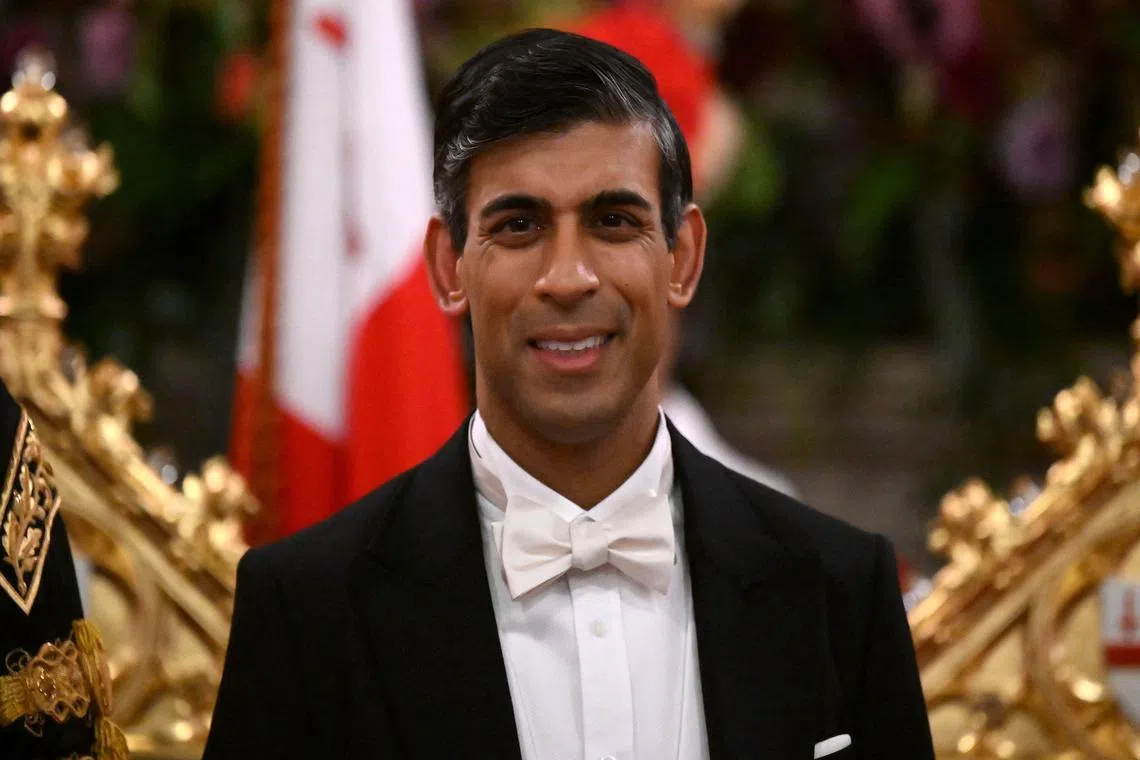British PM Sunak says golden era with China is over
Sign up now: Get ST's newsletters delivered to your inbox

Some in Mr Rishi Sunak’s Conservative Party have been critical of him, regarding the prime minister as less hawkish on China.
PHOTO: AFP
Follow topic:
LONDON – British Prime Minister Rishi Sunak has said that the so-called “golden era” of relations with China is over, adding that Beijing’s systemic challenge to Britain’s interests and values was growing more acute.
Britain’s approach to China needed to evolve and Beijing was “consciously competing for global influence using all the levers of state power”, he said in his first major foreign policy speech at an event in London on Monday.
“Let’s be clear, the so-called ‘golden era’ is over, along with the naive idea that trade would lead to social and political reform,” Mr Sunak said, in a reference to former finance minister George Osborne’s description of Sino-British relations in 2015.
Some in Mr Sunak’s Conservative Party have been critical of him, regarding the Prime Minister as less hawkish on China than his predecessor, Ms Liz Truss.
Last year, when he was finance minister, he called for a nuanced strategy on China to balance human rights concerns while expanding economic ties.
However, a planned meeting between Mr Sunak and China’s President Xi Jinping at November’s Group of 20 summit in Bali fell through. London banned Chinese-made security cameras from sensitive government buildings.
“We recognise China poses a systemic challenge to our values and interests, a challenge that grows more acute as it moves towards even greater authoritarianism,” Mr Sunak said, referring to a BBC statement that one of its journalists had been assaulted by Chinese police on Sunday.
“Of course, we cannot simply ignore China’s significance in world affairs – to global economic stability or issues like climate change. The US, Canada, Australia, Japan and many others understand this too,” he said.
Mr Sunak added that under his leadership, Britain would not choose the status quo and would confront international competitors “not with grand rhetoric but with robust pragmatism”.
His government will prioritise deepening trade and security ties with Indo-Pacific allies, he said, adding that economics and security are indivisible in the region.
The speech came as tensions were further strained between the two nations after Mr Edward Lawrence, working in China as an accredited BBC journalist, was arrested at a Covid-19 lockdown protest in Shanghai and detained for several hours.
The British broadcaster said he was assaulted and kicked by police.
After his release, Mr Lawrence tweeted on Monday to thank his followers, adding he believed “at least one local national was arrested after trying to stop the police from beating me”.
British Foreign Secretary James Cleverly called the incident “deeply disturbing”.
“Media freedom and freedom to protest must be respected. No country is exempt,” he tweeted.
“Journalists must be able to do their job without intimidation.”
Mr Sunak stressed that the media “must be able to highlight these issues without sanction, including calling out abuses in Xinjiang – and the curtailment of freedom in Hong Kong”.
On Ukraine, he said the government would maintain military aid to Kyiv, continuing the strong support offered by former prime ministers Boris Johnson and Truss.
“So, be in no doubt, we will stand with Ukraine for as long as it takes. We will maintain or increase our military aid next year. And we will provide new support for air defence,” he said.
In September, Britain said it was the second-largest military donor to Ukraine after the United States, providing £2.3 billion (S$3.8 billion) of aid in 2022.
Mr Sunak said Britain needed to take the same long-term approach as its adversaries and competitors such as Russia and China.
“In the face of these challenges, short-termism or wishful thinking will not suffice. We can’t depend on Cold War arguments or approaches, or mere sentimentality about the past,” he said. REUTERS, AFP

